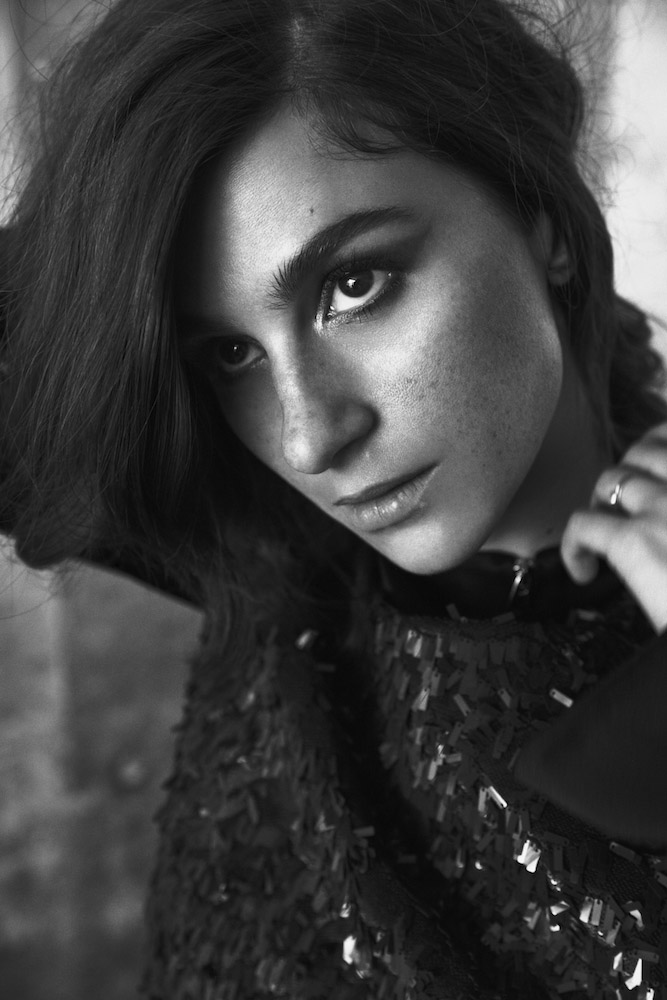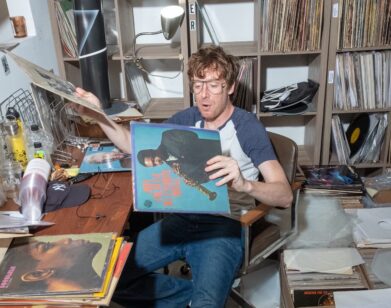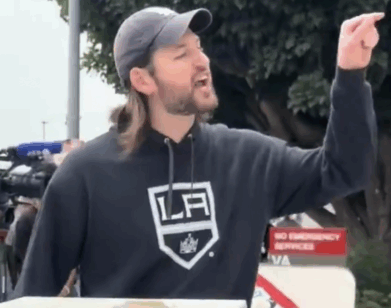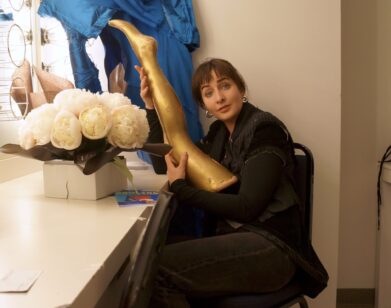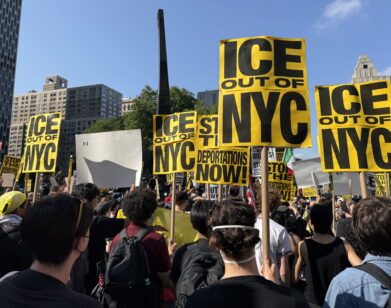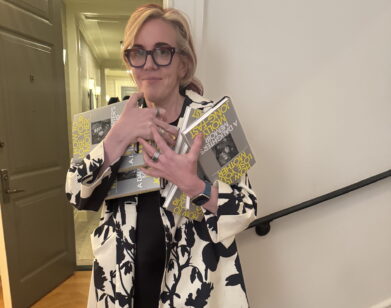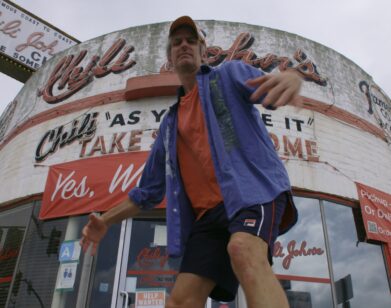Aya Cash
AYA CASH AT THE LINE HOTEL IN LOS ANGELES, AUGUST 2016. PHOTOS: WILLIAMS & HIRAKAWA/ART DEPARTMENT. STYLING: HENNA KOSKINEN/OPUS BEAUTY. HAIR: NIKKI PROVIDENCE/FORWARD ARTISTS USING FREE YOUR MANE. MAKEUP: HOMA SAFAR USING TOM FORD. SPECIAL THANKS: THE LINE HOTEL.
When Aya Cash first auditioned for FXX’s comedy drama You’re the Worst, she did not have high hopes. “My agent sent the script to me,” she recalls. “I read it, I loved it, I thought, ‘I have no shot of getting this.’ I wasn’t necessarily at a point in my career where I was getting to be the leads of shows,” the 34-year-old actor continues. “The character breakdown was pretty intense …. I just pictured someone who was more traditionally TV hot and wrote myself out of it.”
After two seasons, however, it’s difficult to imagine anyone else inhabiting the role of Gretchen Cutler. Together with her boyfriend Jimmy, played by British actor Chris Geere, Gretchen is selfish, cynical, and hilarious. She is also oddly accessible. While many primetime protagonists devolve into caricatures of themselves as a show progresses, Gretchen has only become more nuanced both in terms of her feelings towards Jimmy and her sense of self. “I don’t worry about whether people are going to like her or relate to her,” says Cash of her character. “I find her likeable and relatable enough to play.”
Last night’s Season Three premiere picked up the narrative directly from where things left off: Jimmy is coming to terms with having admitted the depth of his feelings for Gretchen and Gretchen has agreed to seek professional help for her clinical depression, a major plot point of the show’s second season.
“It was really moving to feel like you’ve done something to help people with their own struggles,” says Cash of the critic and fan response to Gretchen’s mental health struggle. “[But] the truth is, you can’t show everyone’s experience with depression in one story, so there were going to be people who didn’t feel like it was their experience, and I can honor that as well.”
The daughter of a poet and writer and a Buddhist teacher, and the granddaughter of tennis champion Pauline Betz Addie, Cash grew up in San Francisco and attended the University of Minnesota’s Guthrie Theater Program. “I made out with a Republican freshman year,” she says, laughing. “That’s a good thing to do once in your life.” After graduating from college, Cash moved to New York. “I was always in love with New York—I had a very romanticized ideal of it,” she says. “I moved with 300 dollars in my pocket and no friends and I got a waitressing job and I just thought, ‘That’s the way it works.'”
EMMA BROWN: How did you first get involved in You’re the Worst?
AYA CASH: I went in for [the showrunner] Stephen [Falk]. I’d met Stephen a year and a half earlier on another project; we’re both from the Bay area, we were both wearing the same sunglasses, and we got along swimmingly. I knew I liked him. I went in for my audition, and I think the first thing I said to him was, “Is it embarrassing for you that you unfollowed me on Twitter?” Because we’d followed each other right after the first meeting, and then he’d unfollowed me. Then I auditioned and I had a callback and a test.
Throughout all of this, I was doing a play in New York [Killers and Other Family at the Rattlesnake Theater]. I was flying into L.A. to do a couple of lines per week on a TV show that I was recurring on, and it just happened to line up with the audition. When I was testing, I flew in in the morning and flew out in the afternoon to be back for my show, which was very intense. I got back for my show and I found out I didn’t get the job, and I was deeply devastated, but they didn’t let me go. They have you on hold when they test you—they didn’t release the hold, but they also didn’t give me the job. They said, “FXX says no.” I’d been through this process before—even if the creator wants you, the network doesn’t, and the network gets what it wants. But Stephen happened to be coming to New York the next week to shoot his episode of Orange is the New Black, so he retested me in the offices of Orange is the New Black and we made a little tape. I said, “Thanks so much, this is very sweet, but maybe I’m going to quit acting and start an antique store.” He sent the tape off and FXX said, “Alright, if that’s really what you want,” and I got the job.
BROWN: How did he respond during the first audition when you said, “Is it embarrassing for you that you unfollowed me on Twitter?”
CASH: He just sort of laughed uncomfortably: “Ohhhh…” There was no discussion of it. I thought, “I’ve completely ruined this audition before it started,” which happens on a regular basis for me, because I can’t keep my mouth shut. Luckily he took the audition over my stupid joke.
BROWN: Were you serious when you said you were going to open an antiques shop?
CASH: I go through phases. Being an actor is definitely not the hardest job in the world—it’s definitely a first-world problem to have, but I’m not very good with rejection. I constantly question whether or not I’m suited for this business, because it is your job to get rejected. Even in success, you’re going to be constantly rejected. Even though I’m on a show that I love with people that I love—I have basically the dream job—that doesn’t mean I’m not getting rejected on a daily basis. That is something that I should be better at, and I work constantly to be better at being rejected, but sometimes I decide, “You know what, maybe I just want a different kind of life. Maybe I want to open an antique store and coffee shop, and have a different kind of life.”
BROWN: How do you try to get better at being rejected?
CASH: Luckily, you have constant opportunities to try. I think it’s about attempting to feel good about the work that you do. The worst feeling in the world is giving a bad audition. I feel crushingly embarrassed when I do bad work, so being rejected after doing bad work is actually harder than being rejected after doing good work. I flew in recently for 13 hours to audition for a Broadway play. I went in, I did a great job, and I found out on the plane back that they weren’t interested. I felt okay, because I knew I did a good job and I just wasn’t for them, and that feels better than when you let the pressure of auditioning get to you and just do bad work. Then you feel like, “I’ve embarrassed myself,” or worse, “The secret’s out. I’m actually terrible and now everyone knows.” I try to focus on the work. I’ve seen some of my favorite actors give bad performances, and I have to tell myself that failure is a part of success. I think there are Ted talks about this. You experiment—you do experimentations on how to make something good—and you’re going to end up with some bad outtakes. You have to be kinder to yourself, because it’s a part of being good.
BROWN: When did you first become interested in the arts? I know your mother [Kim Addonizio] is a poet and you went to a performing arts high school. Were you always enmeshed in the arts?
CASH: I always knew that I’d probably do something in the arts. I wanted to be a writer for a while. I was an excellent child writer. I won multiple poetry contests. I was published at age three—I think that was more about novelty than my immense talent. [laughs] There’s been no nepotism in my acting artistic life, but I think it’s been pretty clear in my writing life. I knew what a pantoum was at age 11—I knew form—therefore I would win the poetry contest. But I also realized that I would never be a great writer. Maybe if I did The Artist’s Way enough I would change my mind, but it just didn’t feel like something that I was dedicated enough to. I didn’t work hard enough. Acting was something I wanted to work at and put the time into. I had gone to private school on scholarship and I didn’t get enough money to go to the private high school, so my parents said, “Why don’t you audition for the arts high school? Then you won’t get beat up.”
BROWN: Was your mother disappointed that you didn’t want to be a writer in the end?
CASH: No. If I had a child and she was a girl, I’d hope she’d do something different from me. There’s innate competition, I think, between mothers and daughters—mine no more so than anyone else. But I think it’s very hard to go into the same business as your family when you’re an artist, and I don’t think there was any disappointment. Both of my parents were incredibly supportive of me being in any arts, because they were both in the arts. They weren’t the typical story of, “Oh, get a real job. You need to make money.” They basically said, “Yup, be an artist. You’ll be broke your whole life but you’ll be happy.”
BROWN: When you get scripts for You’re the Worst, are they just handed to you, or do you sit down and go through them and have a discussion? How does it work?
CASH: They just hand them to us. Luckily, I think we’re a show with a great deal of trust—the actors trust the writers and the writers trust the actors. So there’s not a lot of discussion about storyline: “My character wouldn’t do this.” Once in a while, Chris has something that he feels like is not British—the way that he says something—so that’ll get changed [or] I’ll have a question. But mostly, it’s pretty scripted. Every once in a while we get to improv on an outro when they’re going to play music over it. Other than that, they craft it and we show up and we do it. I come from theater, which is very similar, unless you’re working on a new play. But even that, there are structural rules about how to approach giving notes on a new play. Jeff Daniels said to me during The Newsroom—I’m going to butcher it, but he said: “It’s the writers job to write the script, it’s my job to make it look like they didn’t.” I thought that was a really smart way of thinking about acting. We live in a time where improv is king and people love improv, and I think there’s a time and a place for that and people who are really good at structuring improv. I just worked with Joe Swanberg [on his forthcoming Netflix anthology series Easy] and that was an incredible experience to do improv, but when something is written and structured well, you want to honor that.
BROWN: Has You’re the Worst changed the jobs you get approached about?
CASH: I definitely don’t get offers for “Prostitute Number 2” anymore, which is great, but it changes things and it doesn’t. Offers come up, but I’m still fighting for jobs and auditioning and being rejected. I think that it’s a myth that there’s one job that makes your whole career, unless you’re winning an Oscar. But even that doesn’t work for some people. Cuba Gooding Jr. is back and going to be winning Emmys, but he won an Oscar and then Snow Dogs happened. You never know what’s going to happen, so you just continue with your head down and never expect things to start being handed to you.
BROWN: What sort of response to a character do you need to have in order to feel like, “Okay, I can play this person”? Do you need to like them? Does that help?
CASH: You have to find something you relate to in every character. There are times when I’ve turned down auditions because I haven’t found a way into something, but I also sometimes think that’s cowardice. Sometimes the characters that I’m most resistant to are the ones that I find the most satisfying to play, because you have to dig deeper and you have to find different parts of yourself that are not necessarily the first thing you access and that’s fun and interesting. I think I always find something. No one thinks they’re the evil villain in the story; even if they are doing things that are destructive or “bad,” no one is trying to be bad for the sake of being bad—there’s always a reason behind it. It’s about finding out what’s behind things and the why of behavior. Even Cruella de Vil thinks she’s somehow the hero of her own story as opposed to the villain.
BROWN: What do you want to do in the future?
CASH: I’m starting to produce. I’m developing a project for myself based on one of my mom’s books. I really don’t have a specific idea of where I want my career to go, I just have an idea of wanting to continue to work and work on things that I like and think are good. I don’t need to be crazy rich and crazy famous. I would just like to keep going. The idea of a journeyman actor, people sort of say negatively—”Someone who never made it for real”—[but] I think a journeyman actor is the complete goal. It wasn’t that long ago that I was a full time waitress. So my goal is to start to do that and to start developing projects, because as you get older and you progress in your career, you start to want to have more control over things and you have ideas. You see behind the curtain and you see that, “Oh, not everybody knows exactly what they’re doing.” I’ve always just shown up to set and said the lines, [but] I want to help develop scripts and help cast and help bring a visual tone to something. I don’t know if I’ll ever direct, but producing is dipping my toe into my behind-the-scenes world.
BROWN: Is the goal to never have to take a job? Or do you think that, to a certain extent, it’s up to you and you can really learn from anything?
CASH: I think it would be great to never have to take a job, but I don’t know what the trade off is there. If the trade off is the kind of attention that comes with that, I don’t know if that’s worth it. It’s something that you can only see in success. For years while I was working as a waitress, all I wanted to do was get on a TV show. You think, “This will solve all the problems. I’m making more than 400 dollars a week; I don’t have to worry about money ever again,” but it’s just not true. There are problems everywhere, of course, but you can only see those certain problems when you reach a certain level. So I try to think of those problems as, “This is a sign that I’m having success, that I’m also having issues with this.” But the trade off for the kind of success that can allow you to pick and choose what you want is a different lifestyle.
BROWN: What would you miss about acting if you gave it up and opened your café/antiques store?
CASH: The thing I’d miss most is the feeling when acting is going well, when you start a play and you end the night and you look back and go, “What just happened?” It’s all moving through you—that sort of excitement. It happens on sets too, in fits and spurts instead of one long fluid motion. Different people talk about it differently and it feels cheesy to say it, but “flow” or “spirit” or whatever happens in meditation for some people or even a spiritual experience, that is what I can feel in acting. It’s a feeling that’s also a connection to people and humanity and the world. It doesn’t happen all the time—it’s not a daily basis thing —but that feeling is the most amazing thing about it. I would desperately miss it and need to find another place to find that if I wasn’t an actor.
BROWN: Extreme sports?
CASH: Totally. Extreme sports. Not to get all woo-woo. I am from San Francisco.
YOU’RE THE WORST AIRS WEDNESDAY NIGHTS ON FXX.

